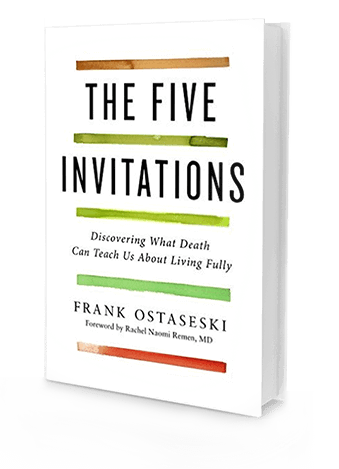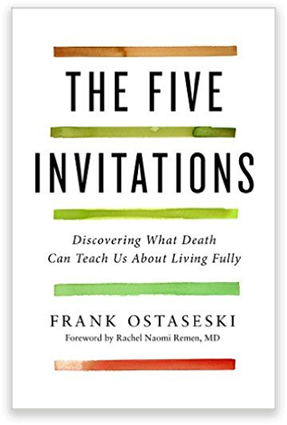BOOK CLUB
Facilitating Discussion and
Sharing Experiences
Discussion is a powerful way of learning, exploring and integrating The Five Invitations . Here are a few helpful tips.
- Create a welcoming environment. Allow participants to introduce themselves.
- Be aware of cultural, social, gender and other differences. Honor diversity practice inclusivity.
- Encourage participants to speak openly and listen generously.
- These are highly personal issues. Be supportive. All thoughts and feelings are welcome.
GENERAL DISCUSSION
Here is a quick discussion guide to encourage meaningful conversation about The Five Invitations in your family, book group, healthcare team or spiritual community. We suggest exploring one invitation per week.
DON’T WAIT
Frank writes, “Instead of pinning our hopes on a better future, we focus on the present and being grateful for what we have in front of us right now. We say “I love you” more often because we realize the importance of human connection. We become kinder, more compassionate, and more forgiving. Don’t wait is a pathway to fulfillment and an antidote to regret”.
Discussion Questions
- What are you waiting to say, do or be in your life? Pick one and share honestly.
- Change is constant and inevitable. Explore your relationship to constant change. What is one change you are grateful for? How did it open the door to a new possibility?
- Hope is an innate human quality that can positively contribute to a sense of wellness. Mature hope requires both a clear intention and a simultaneous letting go. How can you be open to outcome without be attached to a specific result?
- Forgiveness has many benefits. The author suggests that it’s like “setting down a hot coal we have been carrying in our hand”. What have been the obstacles to forgiveness in your life?
- How has the contact with the precariousness of life helped you to appreciate its preciousness?
WELCOME EVERYTHING, PUSH AWAY NOTHING
Frank writes, “In welcoming everything, we don’t have to like what is arising. It’s actually not our job to approve or disapprove. The word welcome confronts us; it asks us to temporarily suspend our usual rush to judgment and to simply be open to what is happening. When we are open and receptive, we have options. We are free to discover, to investigate, and to learn how to respond skillfully to anything we encounter. Welcome everything, push away nothing cannot be done solely as an act of will. To welcome everything is an act of love.”
Discussion Questions
- Openness is the basis for a skillful response to life. What is your tolerance for the unknown?
- Discuss the difference between acceptance and resignation. How do they feel different in your heart? What are the sensations you associate with each in the body?
- What self-image have you stopped worrying about in your life?
- Pain + Resistance = Suffering. What is an example of that in your life?
- As people come closer to death, only two questions really matter: “Am I loved?” and “Did I love well?” How might you respond to those questions today?
BRING YOUR WHOLE SELF TO THE EXPEREINCE
Frank writes, “We all like to look good. We long to be seen as capable, strong, intelligent, sensitive, spiritual, or at least well adjusted. We project a positive self-image. Few of us want to be known for our helplessness, fear, anger, or ignorance, or that sometimes we are more of a mess than we’d like to admit. To be whole, we need to include, accept, and connect all parts of ourselves. Wholeness does not mean perfection. It means no part left out.”
Discussion Questions
- When we over-identify with a role, it defines us, confines us, and reduces our capacity for conscious choice. It sets up an expectation about how life is supposed to proceed. What roles do you still carry that you no longer need?
- When you help, you see life as weak. When you fix, you see life as broken. When you serve, you see life as whole. Share a moment when you authentically served another person.
- When you were a child and an adult criticized you how did you respond? Did you withdraw, collapse or silence yourself? Did you try to please and accommodate, negotiate, persuade, or explain? Did you rebel, talk back, act with hostility? How do you continue these strategies in dealing with your inner critic today? Do they work?
- Suppose a grieving woman like Kisa Gotami knocked on your front door, holding a dead child in her arms. Imagine your response. What would you do when you opened the door?
- Even when we’ve devoted our life to compassionate action, we will at times become overwhelmed by suffering. How do you restore yourself and compassion in your life?
FIND A PLACE IN THE MIDDLE OF THINGS
Frank writes, “We often think of rest as something that will come to us when everything else in our lives is complete: At the end of the day, when we take a bath; once we go on holiday or get through all our to-do lists. We imagine that we can only find rest by changing our circumstances. This place of rest is always available to us. It is a choice—a choice to be alert, to bring your attention to this moment.”
Discussion Questions
- We can be addicted to being busy, to multi-tasking and productivity to the point of exhaustion. Explore the counter-intuitive question, “What’s right about being exhausted?”
- Share a moment when you have felt calmness in the midst of chaos?
- There are three common impersonal conditions that shape all of our personalities. Reflect for a moment. Do you tend to demand, defend or distract in a new situation?
- Breath animates human life and sustains it. In meditation, we use breath to focus our attention on the present. Observe, feel and sense your breath for 3 minutes counting each exhale. When you notice that you have been distracted by a thought, feeling or sensation, begin the count again. How many breaths did you count before being distracted?
- Discuss a moment when you had the courage to share your vulnerability?
CULTIVATE A DON’T KNOW MIND
Frank writes, “Cultivate don’t know mind may seem confusing at first. Why should we seek to be ignorant? Don’t know mind is one characterized by curiosity, surprise, and wonder. It is receptive, ready to meet whatever shows up as it is. Don’t know mind is an invitation to enter life with fresh eyes, to empty our minds and open our hearts.”
Discussion Questions
- When our minds are made up, it can narrow our vision, obscures our ability to see the whole picture, and limits our capacity to act. How did you respond to a surprise today? Were you flexible or not flexible?
- Most of us are strongly identified with our rational-thinking minds. The idea of losing control is frightening to most of us. How do you feel when you forget the name of a place or a person?
- Not knowing is a gateway to a deeper appreciation of the potency of our basic nature, which cannot be known by the conceptual mind alone. Share a moment when you instinctively understood something, or what to do, without figuring it out.
- Surrender happens when we stop fighting. We stop fighting against ourselves. We stop fighting with life. Surrender is a state in which resistance of any kind ceases to occur. We no longer put up any defense. Describe a positive experience of surrender.
- There’s an old tradition in Japan of Zen monks and others writing short death poems. They often express an essential truth discovered in one’s life. Take a moment to write a four-line death poem.


